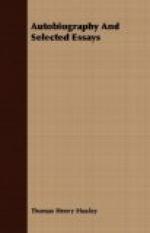But the plague? My Lord Brouncker’s observation would not, I fear, lead him to think that Englishmen of the nineteenth century are purer in life, or more fervent in religious faith, than the generation which could produce a Boyle,[40] an Evelyn,[41] and a Milton. He might find the mud of society at the bottom, instead of at the top, but I fear that the sum total would be as deserving of swift judgment as at the time of the Restoration.[42] And it would be our duty to explain once more, and this time not without shame, that we have no reason to believe that it is the improvement of our faith, nor that of our morals, which keeps the plague from our city; but, again, that it is the improvement of our natural knowledge.
We have learned that pestilences will only take up their abode among those who have prepared unswept and ungarnished residences for them. Their cities must have narrow, unwatered streets, foul with accumulated garbage. Their houses must be ill-drained, ill-lighted, ill-ventilated. Their subjects must be ill-washed, ill-fed, ill-clothed. The London of 1665 was such a city. The cities of the East, where plague has an enduring dwelling, are such cities. We, in later times, have learned somewhat of Nature, and partly obey her. Because of this partial improvement of our natural knowledge and of that fractional obedience, we have no plague; because that knowledge is still very imperfect and that obedience yet incomplete, typhoid is our companion and cholera our visitor. But it is not presumptuous to express the belief that, when our knowledge is more complete and our obedience the expression of our knowledge, London will count her centuries of freedom from typhoid and cholera, as she now gratefully reckons her two hundred years of ignorance of that plague which swooped upon her thrice in the first half of the seventeenth century.




